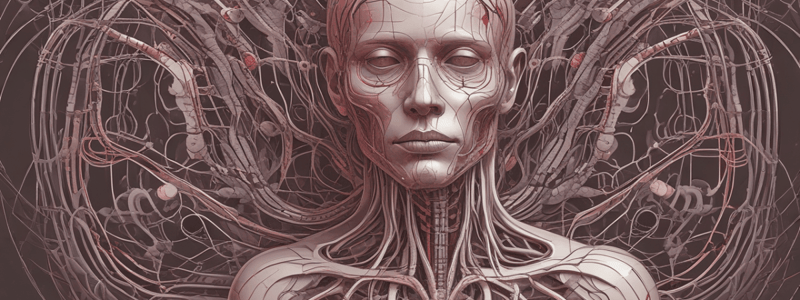Podcast
Questions and Answers
What is the main function of the heart in the circulatory system?
What is the main function of the heart in the circulatory system?
- To pump blood throughout the body (correct)
- To regulate body temperature
- To filter out cell wastes from the blood
- To produce oxygen for the body
What is the purpose of the atria in the heart?
What is the purpose of the atria in the heart?
- To regulate body temperature
- To pump blood out of the heart
- To filter out cell wastes from the blood
- To provide a space for blood to come into the heart (correct)
What is the sound produced by the heart valves closing?
What is the sound produced by the heart valves closing?
- Beep-beep
- Lub-dub (correct)
- Thump-thump
- Buzz-buzz
What do blood vessels carry?
What do blood vessels carry?
What is the direction of blood flow in arteries?
What is the direction of blood flow in arteries?
What is the function of the strong muscles in the walls of the aorta?
What is the function of the strong muscles in the walls of the aorta?
Why do arteries get smaller as blood moves away from the heart?
Why do arteries get smaller as blood moves away from the heart?
What is the function of the valves in the veins?
What is the function of the valves in the veins?
Why are capillaries important?
Why are capillaries important?
What carries blood directly back to the heart?
What carries blood directly back to the heart?
What happens to the pressure of blood as it moves away from the heart?
What happens to the pressure of blood as it moves away from the heart?
What is special about the walls of capillaries?
What is special about the walls of capillaries?
What is the role of the vena cava?
What is the role of the vena cava?
Why are the walls of the aorta strong?
Why are the walls of the aorta strong?
What happens to the size of arteries as blood moves away from the heart?
What happens to the size of arteries as blood moves away from the heart?
What is the approximate number of times the heart pumps blood through the body in a day?
What is the approximate number of times the heart pumps blood through the body in a day?
Where is the heart located in the body?
Where is the heart located in the body?
What is the function of the ventricles in the heart?
What is the function of the ventricles in the heart?
What do blood vessels resemble?
What do blood vessels resemble?
What type of substances are carried by the blood through the circulatory system?
What type of substances are carried by the blood through the circulatory system?
Study Notes
Circulatory System
- The circulatory system moves essential materials like oxygen, nutrients, and cell wastes throughout the body.
Heart
- The heart pumps blood throughout the body, working around 100,000 times a day, approximately 3 million times a month.
- The heart is a muscular organ situated on the left-hand side of the chest, with four rooms called chambers (two atria and two ventricles).
- The chambers have valves between them, which open and close to maintain a one-way blood flow, producing the lub-dub sound of a heartbeat.
Blood and Blood Vessels
- Blood vessels (arteries, veins, and capillaries) are like the body's roadways, carrying blood to every part of the body.
- Blood is the fluid that moves through the circulatory system, carrying oxygen, nutrients, and cell wastes.
Types of Blood Vessels
- Arteries carry blood away from the heart, with the aorta being the largest artery, which has strong muscles to withstand the heart's pumping force.
- Veins carry blood back to the heart, with the vena cava being the largest vein, and have valves to prevent backward blood flow.
- Capillaries are tiny blood vessels that connect arteries and veins, with thin walls allowing for the exchange of oxygen, nutrients, and cell wastes between blood and body cells.
Circulatory System
- The circulatory system moves essential materials like oxygen, nutrients, and cell wastes throughout the body.
Heart
- The heart pumps blood throughout the body, working around 100,000 times a day, approximately 3 million times a month.
- The heart is a muscular organ situated on the left-hand side of the chest, with four rooms called chambers (two atria and two ventricles).
- The chambers have valves between them, which open and close to maintain a one-way blood flow, producing the lub-dub sound of a heartbeat.
Blood and Blood Vessels
- Blood vessels (arteries, veins, and capillaries) are like the body's roadways, carrying blood to every part of the body.
- Blood is the fluid that moves through the circulatory system, carrying oxygen, nutrients, and cell wastes.
Types of Blood Vessels
- Arteries carry blood away from the heart, with the aorta being the largest artery, which has strong muscles to withstand the heart's pumping force.
- Veins carry blood back to the heart, with the vena cava being the largest vein, and have valves to prevent backward blood flow.
- Capillaries are tiny blood vessels that connect arteries and veins, with thin walls allowing for the exchange of oxygen, nutrients, and cell wastes between blood and body cells.
Studying That Suits You
Use AI to generate personalized quizzes and flashcards to suit your learning preferences.
Description
Learn about the circulatory system and its importance in the human body. Discover how the heart pumps blood throughout the body and its role in maintaining life.




